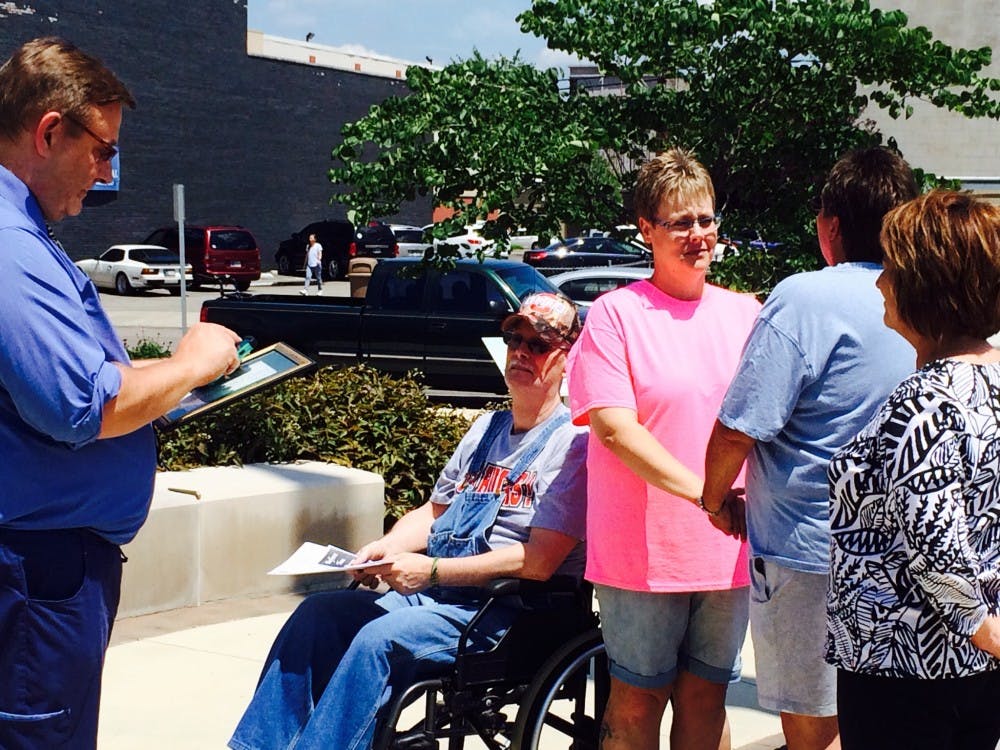After a stay put a halt to same-sex marriages in Indiana on Friday, the future for marriage equality continues to be rocky for couples looking for state recognition.
The Indiana attorney general’s office, along with the Indiana State Department of Health commissioner, the Boone County clerk and the Hamilton County clerk, filed a motion for the emergency stay during the appeals process. Couples were able to apply for marriage licenses Wednesday after a federal judge struck down Indiana’s ban on same-sex marriage.
As for couples who filed marriage licenses already, their status is in limbo.
The attorney general’s office said in a press release that it’s premature to require Indiana to change its definition of marriage until the U.S. Supreme Court weighs in on the issue, which is widely expected.
Prior to U.S. District Judge Richard Young’s ruling Wednesday, Indiana had refused to recognize same-sex marriages that were performed legally out of state. Indiana’s law defines marriage between a man and a woman.
Earlier this year, lawmakers tried to take the law one step further by writing that definition into the state constitution with House Joint Resolution 3.
HJR-3 passed through the state Legislature earlier this year, however the wording was changed to include domestic partnerships. This means HJR-3’s new wording will need to pass through the House and the Senate again in the upcoming session before it can go to a public vote, the earliest in 2016.
Young wrote in his ruling that Indiana’s ban on same-sex marriage violated the Equal Protection Clause of the U.S. Constitution.
“In less than a year, every federal district court to consider the issue has reached the same conclusion in thoughtful and thorough opinions — laws prohibiting the celebration and recognition of same-sex marriages are unconstitutional,” Young wrote in his decision.
Due to his ruling Wednesday, same-sex couples were allowed to apply for marriage licenses, file joint tax returns, receive pension benefits and have their partners listed as spouses on death certificates. The state was ordered to also recognize legally performed out of state same-sex marriages. The stay halted this.
INDIANA MARRIAGES
For the two and a half days same-sex marriage was legal, couples hurried to state buildings to sign up for marriage licenses before the stay was granted.
Tyler Quear, a senior nursing major, had been engaged to his fiancé, John Soto, for eight months when same-sex marriage became legal in Indiana.
“I was overjoyed and kind of caught off guard,” he said. “I, honestly, was not expecting it to go that way.”
The couple rushed to downtown Indianapolis to be married Wednesday, both of their moms rushing with them to attend the ceremony.
“It felt liberating,” he said.
Some other couples who received their marriage license had been waiting for more than a decade.
After being together for 14 years, Joyce and Jennifer Smith of Muncie became a legally married couple Thursday.
“I never thought this would happen,” Joyce Smith said. “It’s a long time coming.”
The couple tied the knot just a few steps from the Delaware County Building where more than 15 same-sex couples received their licenses before the stay was issued Friday.
Joyce Smith said she got online during lunch at work Thursday and found out same-sex marriage was legal for Hoosiers. She immediately called Jennifer Smith to tell her the news.
Neither questioned whether they should get married.
After she hung up, Jennifer Smith began calling friends and relatives to tell them the news. Meanwhile, Joyce Smith talked to her boss, an ordained minister, who let her leave work early and agreed to officiate the ceremony.
As the Smiths gave their vows and shared their first kiss as a married couple, a few onlookers and county workers walked up to them to wish them good luck in the face of a lifetime commitment with the federal ruling’s shaky future.
PUSH TO KEEP FIGHTING
While the stay may be a hit to same-sex marriage rights in Indiana, it also acts as a charge to keep fighting for at least one proponent.
“It is frustrating, but it’s also a push to keep going, keep signing petitions,” said Christie McCauley, president of Spectrum, a campus group for lesbian, gay, bisexual, transgender and queer students and allies. “... It is like a drive, I guess.”
She said the court’s decision to stop marriages across the state was inevitable.
“I am not surprised — a little sad — but not surprised,” she said. “It is Indiana. We are known for being a very red state, and we have had a lot of strong proponents against same-sex marriage for a while.”
Although marriages are stopped for now, McCauley is confident that if the case reaches the Supreme Court, marriage equality would prevail. The decision would stop the flip-flopping rulings that have plagued state decisions on same-sex marriage, she said.
McCauley said Indiana’s reputation as a red state made Wednesday’s decision a stepping stone toward legalization in other states, and the stay didn’t affect that.
“I don’t think the stay undoes the progress that that ruling made. ... It made a lot of progress,” she said. “I don’t think it will be long now that ... we [will] have it again.”
Evie Lichtenwalter contributed to this article.
Related articles:
- Same-sex marriage now halted in Indiana during appeals process
- Delaware County couples hurry to marry before potential stay
- Marriage equality becomes reality for Hoosiers
- U.S. judge strikes down Indiana ban, same-sex couples can marry
- HOWE ABOUT THAT: Don’t get too excited about Indiana’s marriage equality





